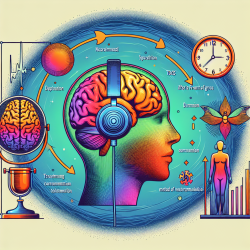As a Special Education Director, one of my primary responsibilities is to ensure that our educational strategies are both effective and evidence-based. One promising area of research has shown that music training can significantly improve the preattentive perception of voice onset time (VOT) in children with dyslexia. This finding has the potential to transform how we approach the rehabilitation of children with language impairments.
The Power of Music Training
A recent longitudinal study titled Music Training Positively Influences the Preattentive Perception of Voice Onset Time in Children with Dyslexia revealed some groundbreaking results. Conducted over six months, the study compared the effects of active music training against painting training on the preattentive processing of phonological parameters in children with developmental dyslexia (DD). The results were clear-cut: music training normalized the preattentive processing of VOT in children with DD, unlike painting training.
Why This Matters
Children with dyslexia often struggle with phonological processing, which impacts their reading, writing, and overall language acquisition. By integrating music training into their educational programs, we can provide a powerful tool to enhance their phonological abilities. The study found that music training increased the N250 amplitude to duration deviant stimuli in children with DD, which is a significant indicator of improved phonological processing.
Implementing Music Training
For practitioners looking to incorporate these findings into their practice, here are some steps to consider:
- Integrate Music Training Programs: Collaborate with music educators to develop a curriculum that includes active music training sessions. The Kodály and Orff methods are particularly effective.
- Focus on Rhythmic and Motor Components: Emphasize rhythm, tempo, and sensorimotor synchronization in your music training sessions to enhance phonological processing.
- Monitor Progress: Use neuropsychological assessments and electrophysiological tests to track improvements in phonological processing and adjust the training program as needed.
- Engage Parents and Teachers: Educate parents and teachers about the benefits of music training and encourage their involvement to ensure a supportive learning environment.
Encouraging Further Research
While the results of this study are promising, further research is needed to fully understand the long-term benefits of music training for children with dyslexia. I encourage practitioners to stay updated with the latest research and consider participating in studies to contribute to this growing field of knowledge.
To read the original research paper, please follow this link: Music Training Positively Influences the Preattentive Perception of Voice Onset Time in Children with Dyslexia: A Longitudinal Study










